Using Zoom Room Autonomous Single App Mode with MDM
Autonomous Single App Mode (ASAM) allows Zoom Rooms to run automatically and stay in the foreground of the device. If the iPad signs out from the Zoom Rooms, it will leave ASAM. If you are experiencing network issues, you can also leave ASAM to resolve them.
Requirements for configuring Autonomous Single App Mode for Zoom Rooms
- Zoom Rooms Controller for iOS global minimum version or higher
- Device enrolled in Apple’s Device Enrollment Program (DEP) or using Apple Configurator and a Mobile Device Management program
How to enable Autonomous Single App Mode
- Sign in to the Zoom web portal.
- Click Room Management then Zoom Rooms.
- Click Account Settings.
- Under Device management, click the toggle
 for Autonomous Single App Mode.
for Autonomous Single App Mode. - Click Enable.
Note: You can also enable this for a location, floor, or individual room. Read more about changing settings based on location.
After enabling this setting on the web, you will need to configure the device in your MDM service. In your MDM service, add the key-value pair to the Restrictions Payload with the key autonomousSingleAppModePermittedAppIDs and the value us.zoom.zpcontroller. We recommend contacting Apple or your MDM service if you need assistance as every MDM may manage this differently.
How to configure ASAM with AirWatch
Configuring a new profile
- Follow the steps above to enable Autonomous Single App Mode in the Zoom web portal.
- In AirWatch, click Devices, then click Profile & Resources, then click Profiles.
- Click Add, then Add Profile.
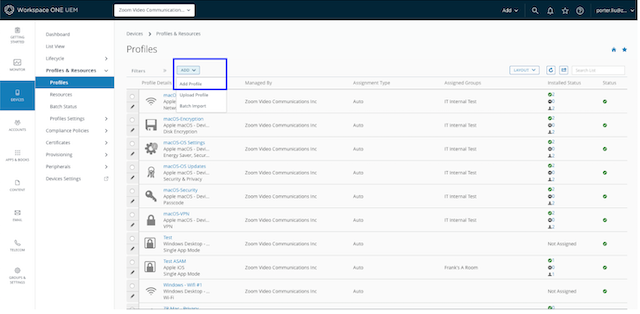
- Click iOS.
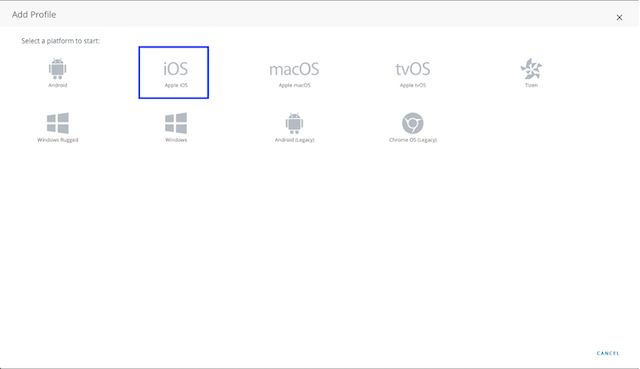
- In the General tab, complete the following information. Other fields are optional.
- Name: Enter a descriptive name for your device.
- Smart Groups: Select an existing one or create a new one. The profile will be assigned to the devices in this smart group.
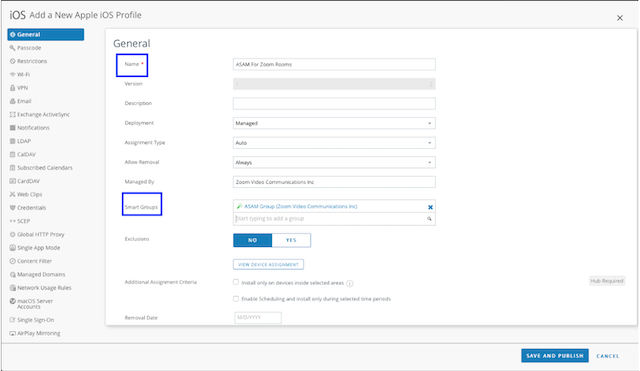
- Select Single App Mode in the sidebar.
- Select the Filter Type, Permitted Apps for Autonomous Single App Mode.
- Fill the Permitted Applications Bundle ID with "us.zoom.zpcontroller".
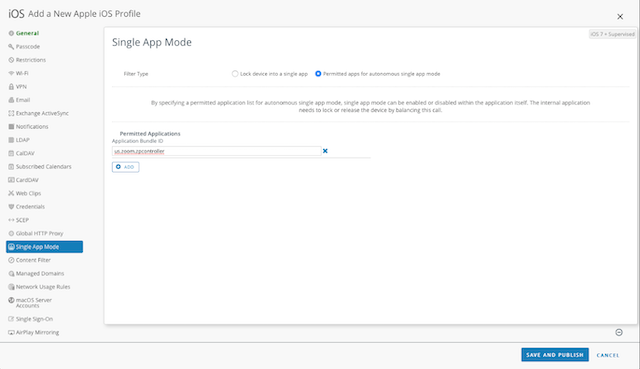
- Click Save and Publish on the bottom right
- Click View Device Assignment and click Publish. The profile will be installed to the above devices.
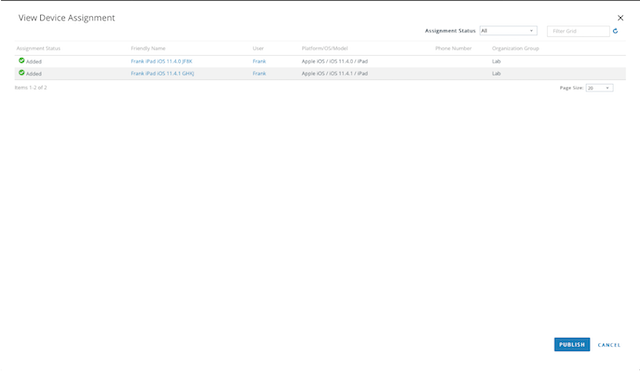
Adding new devices to an existing profile
- In AirWatch, click Groups & Settings in the sidebar and select Assignment Groups.
- Click the group that is chosen when adding the profile.
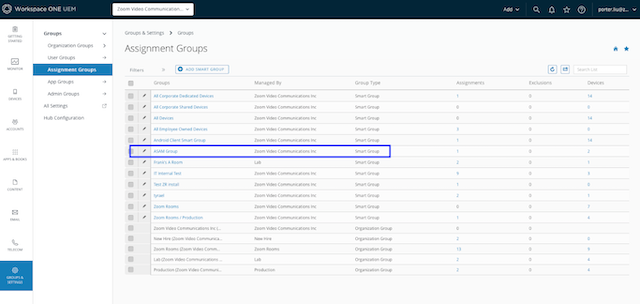
- Add your devices to the group and click Next.
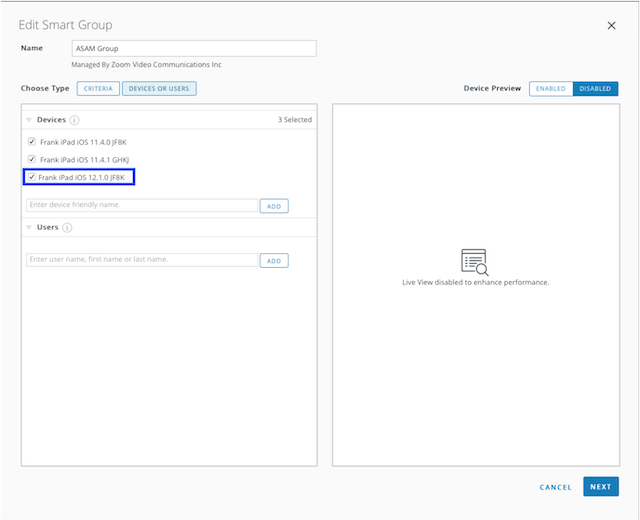
- Click Publish. The ASAM profile will be installed on the newly-enrolled device.
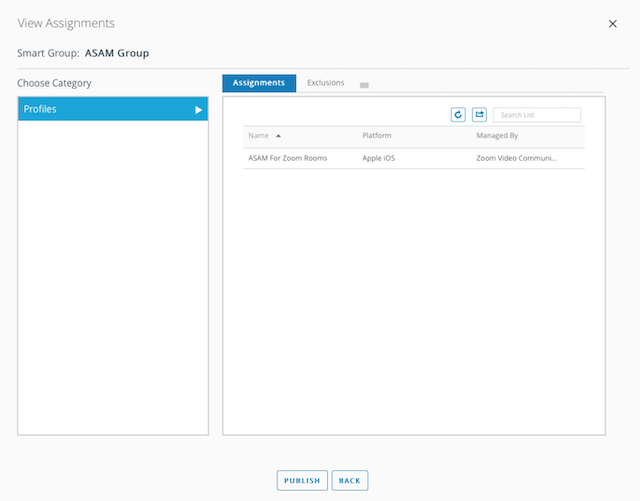
How to configure ASAM with Jamf
- Follow the steps above to enable Autonomous Single App Mode in the Zoom web portal.
- In Jamf, click Configuration Profiles then click New.
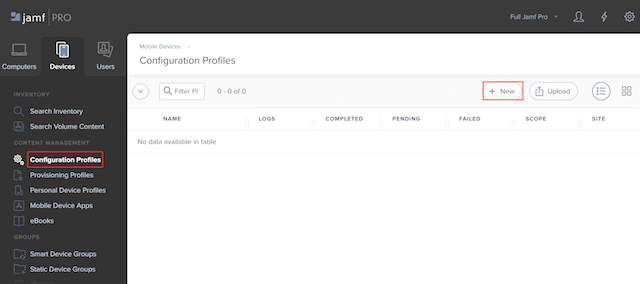
- Click Restrictions then click Configuration.
- Click iOS then click Applications.
- Scroll to the bottom and find the Autonomous Single App Mode apps (supervised only) options, then click Add.
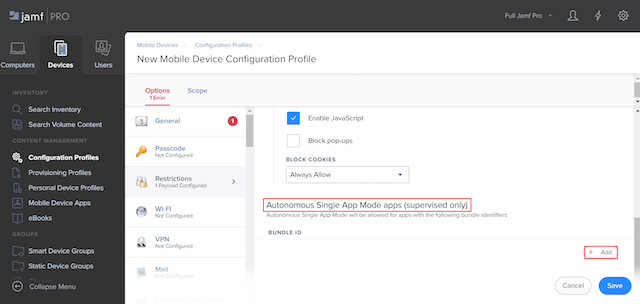
- Enter us.zoom.zpcontroller as the Bundle ID, then click Save.
- Click General, then name the profile.
- Click Scope then click Add.
- Choose a device then click Add and Done.
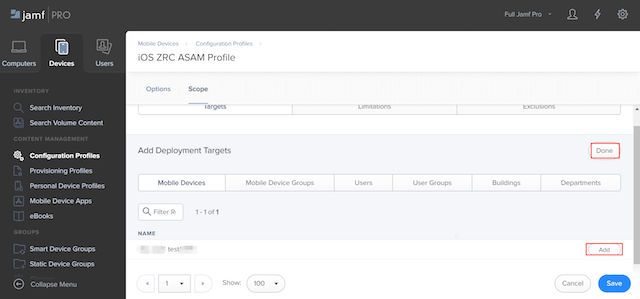
- Click Save, then click Configuration Profiles to see review the profile information.
How to configure ASAM with Intune
- Follow the steps above to enable Autonomous Single App Mode in the Zoom web portal.
- Sign in to Intune.
- Click Device configuration.
- Click Profiles, then click Create profile.
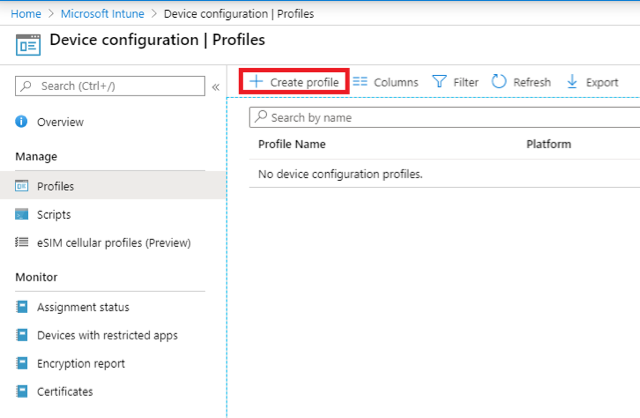
- Under Platform, select iOS/iPadOS.
- Under Profile select Device restrictions.
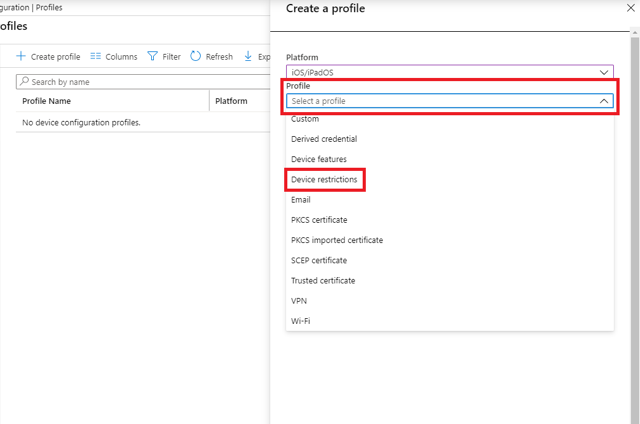
- Click Create.
- Enter the Name of the profile.
- Under Device Restrictions, select Autonomous Single App Mode.
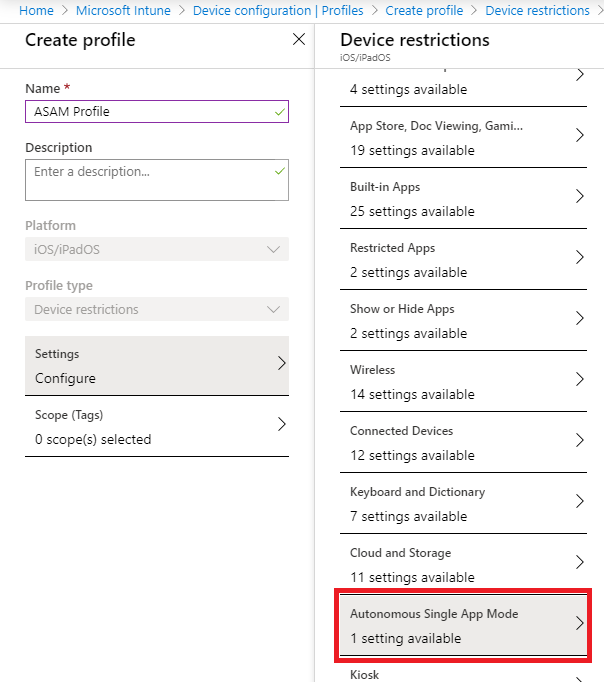
- Enter the following information:
- App name- Zoom Rooms
- App Bundle ID- us.zoom.zpcontroller
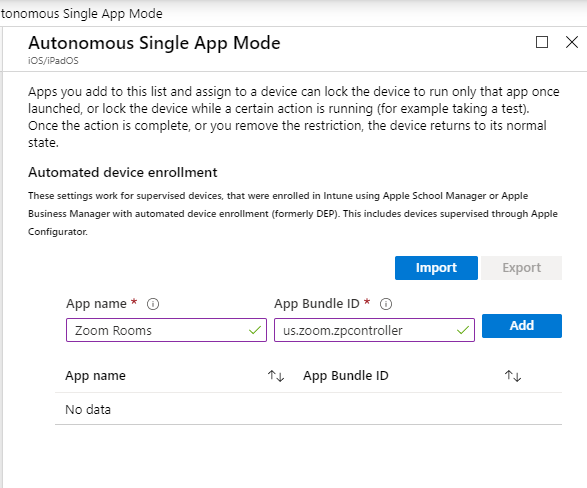
- Click Add, then click OK.
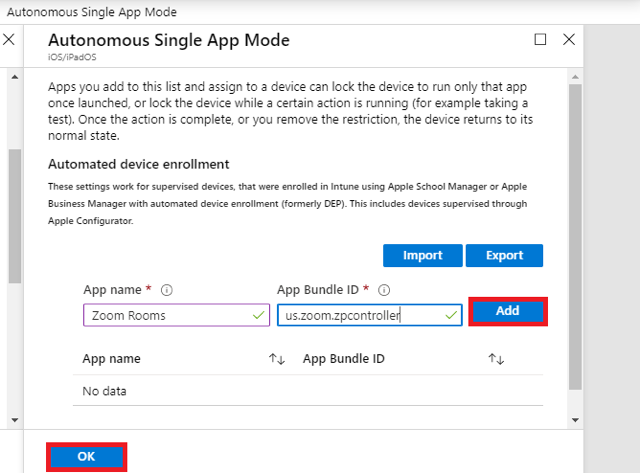
- Click OK under Device restrictions.
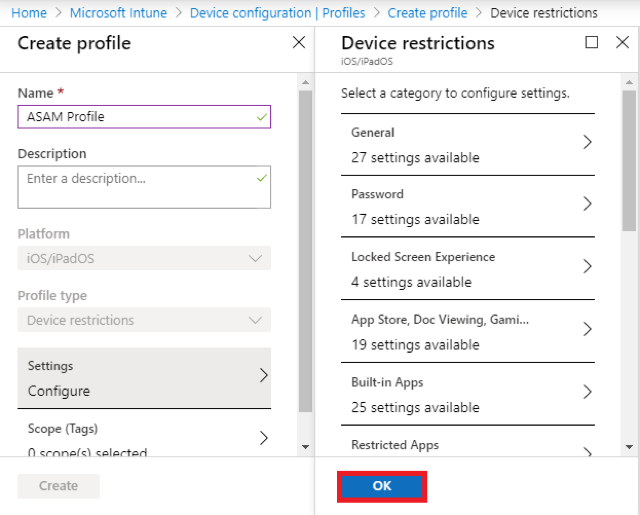
- Click Create.
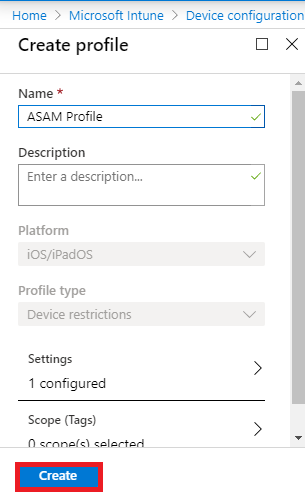
- Once the profile is created, click Assignments.
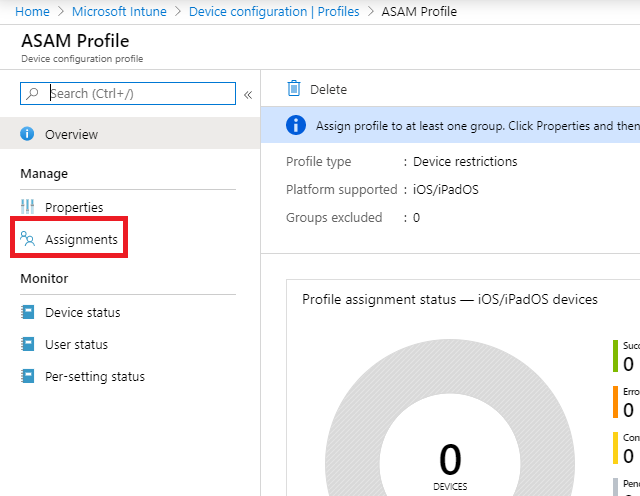
- Under Include, select your deployment scope.
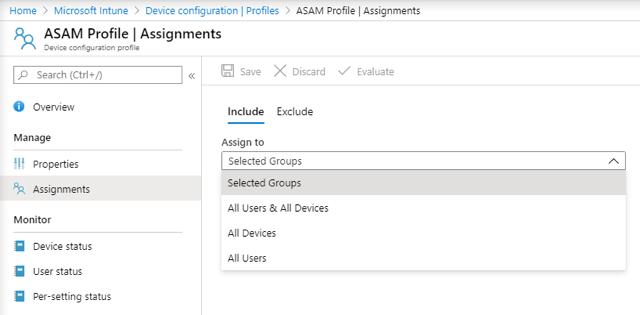
- Click Save.



















